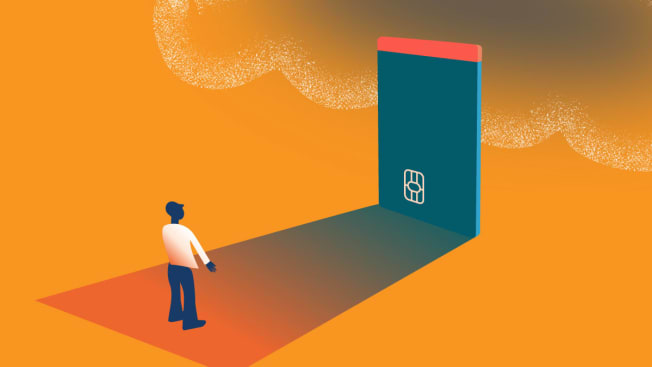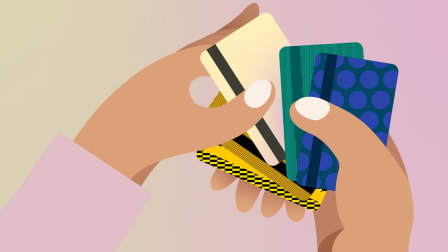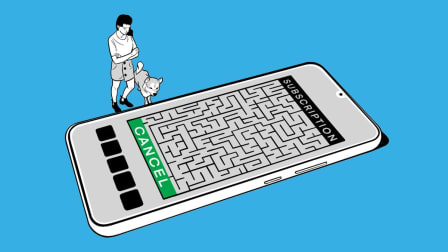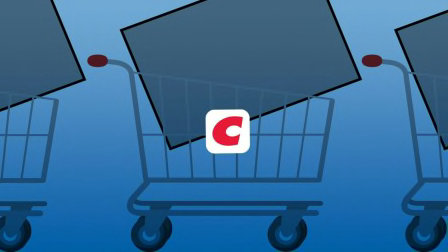How to Avoid Credit Card Late Fees
Credit card companies rake in billions each year collecting late fees. Change is coming, but here’s what you need to know in the meantime.

A man in Poughkeepsie, N.Y. with a $35 balance on his credit card says he was socked with a $41 late fee each of the three months he was unable to pay his bills because he was hospitalized. A woman in Union City, Calif., was hit with a $30 charge after paying her credit card bill a day late after an unexpected death in her family, while a man in Mishawaka, Ind., was charged a $33 late fee because the payment he made on a Friday wasn’t credited till the next Monday, making it a day late.
Those people, all of whom shared their stories with Consumer Reports, are among the 1 in 5 adult Americans—an estimated 52 million people—who paid a credit card late fee in the last 12 months, according to a September 2023 Consumer Reports nationally representative survey of 2,089 adults (PDF).
The frequency with which late fees are charged and the financial burden they create has made them a focus of the Consumer Financial Protection Bureau. The CFPB points out that these fees provide a giant source of revenue for credit card companies—in 2020, they raked in $12 billion this way. And while it may be reasonable to charge a customer a penalty for the costs incurred when a payment is late, the agency says, the size of the fee—which averages $30 for the first offense and $41 for subsequent ones–has gotten out of proportion and has little purpose but to pad profits.
In This Article
Fee Creep • How Fees Harm Consumers • 6 Ways to Avoid Credit Card Late Fees
The CFPB recently proposed a rule that will still allow credit card companies to charge late fees, just ones it says are more in line with the true costs. The rule would slash late fees to no more than $8 (or, at the credit card company’s discretion, to 25 percent of the minimum balance due), and ban companies from increasing fees by the rate of inflation, as they have been doing. In CR’s survey, 82 percent of Americans said they supported lowering the maximum late fee. The final rule is expected by the end of the year and to take effect 60 days after that.
Fee Creep
Today’s rules around late fees weren’t what Congress intended when it passed the Credit Card Accountability Responsibility and Disclosure (CARD) Act of 2009—itself intended to curb industry abuses.
Before the CARD Act, a Supreme Court case nullified state limits on late fees at national banks, causing fees to soar to an average of $35 (about $50 in today’s dollars). But according to the CFPB, after the CARD Act was passed and fees dropped, the Federal Reserve, which was responsible for implementing it, allowed credit card companies to exploit loopholes and tie fee increases to the rate of inflation. As a result, fees crept back up.
While some small banks and credit unions charge late fees of $25 or less, and a small but growing number of companies charge none at all or have special programs that offer payment flexibility, almost all of the major credit card issuers charge the maximum amount the law currently allows, the CFPB says.
When the rule was proposed, the American Bankers Association, the Consumer Bankers Association, and the National Association of Federally-Insured Credit Unions—all industry groups—said it was based on incorrect assumptions about credit card late fees. They called the rule flawed policy that would harm all cardholders whether they pay on time, pay late, or carry a balance because it would make credit cards cost more and be harder to obtain.
How High Fees Harm Consumers
No one likes being hit with a fee, especially these days when everything has become so expensive. But credit card late fees are problematic not just because they cost so much. For example:
People with a low income pay proportionately bigger fees. There are two reasons for this. First, people with lower incomes tend to have smaller credit card balances, the CFPB says. A flat $30 or $41 late fee due on a small amount of money owed means fees cost much more percentage-wise than they would on a larger debt.
Second, low-income earners pay almost twice as much in actual fees as high-income earners. When charged a late fee, people who make $150,000 a year paid an average of $15, while those earning $32,000 paid twice that amount, around $32, according to a CFPB analysis. One possible reason? “It could be that banks waive late fees more often for their well-to-do clients in an effort to keep them happy,” says Bill Hardekopf, CEO of BillSaver.com, a free service to help negotiate a lower rate for your bills. Another: Lower-income clients may not be so willing to ask a bank to remove or reduce their late fees.
People in majority Black neighborhoods pay more in late fees. The CFPB’s analysis also found that in ZIP codes where 90 percent of people are Black, the burden of late fees is felt hardest. Per account, Black people were charged on average more than $25 in late fees, while in places where the Black population was nearly zero, people paid less than $20 in late fees.
“The burden of high late fees appears to fall heavily on communities of color, and people living paycheck to paycheck, who have less income and assets,” Bell says. “These sharp, back-end penalties for paying late in effect make credit a lot more expensive for these customers.”
Late fees may be charged even if the payment is just an hour late. The CFPB says most banks accept payments for that day up until 5 p.m. But Consumer Reports received stories from people who said they didn’t know which time zone the 5 p.m. deadline referred to, or who were just an hour or so late and still charged a substantial late fee.
For example, a woman in Eureka, Calif., another in Milo, Maine, and a man in Summerlin, Nev., all say they were hit with late fees of $41, $32, and $35, respectively, after paying their bill at 6 p.m. instead of 5 p.m. Another consumer in Montgomery, N.Y., told us he was hit with a late fee of $29 because the bank’s cutoff was 8 p.m. EST and not midnight, as is the case with his other accounts.
Other consumers said they wound up paying late fees because their payments weren’t credited over the weekend. “Requiring credit card companies to provide a 15 day grace period for payments would minimize the pain of scheduling conflicts, whether it’s over a weekend or holiday, or because of time zone confusion,” Bell says.
Many people must prioritize paying rent and utilities or other debt. In the CR survey, we asked respondents who faced a late fee in the past year the reason or reasons it happened. Many (19 percent) said it was because they needed to pay other essentials first, such as rent or utilities. Others said they had an emergency that resulted in their inability to pay (17 percent), or they prioritized paying other debt (14 percent). Nine percent said they simply didn’t have the money.
“I’ve been charged credit card late fees several times, and every time it’s not because I haven’t wanted to pay on time, but because I simply didn’t have the funds, hence needing credit cards to pay for basic needs like food and medical care,” Desirae Golis, from Anacortes, Wash., told CR. “Late fees are essentially a penalty for the poor, as of course the wealthy can set automatic payments and pay on time without fear of overdrafting.”
Good to Know
Did you get hit with a late fee anyway? Contact your credit card company to ask if it will remove the charge, says Bill Hardekopf, CEO of BillSaver.com. The credit card issuer will usually do this if it’s a one-time mistake.
6 Ways to Avoid a Credit Card Late Fee
1. Sign up for monthly bill reminders via text or email. Don’t rely on paper bills sent via snail mail, or your memory, to remind you to pay a bill, Hardekopf says. In CR’s survey, the most common reason people said they were late with a payment was that they thought they’d already paid the bill (27 percent). For 12 percent, one of the problems was that they didn’t know when the payment was due. (Set up alerts by going online to your account, Hardekopf says, or by calling the credit card company’s customer service number.)
2. Skip the mail and make payments digitally—or over the phone. In the CR survey question that asked about why a payment was late, 11 percent of Americans who were charged a late fee in the past year said it was due to the mail taking longer than expected.
Other people who shared their stories with CR said using their bank’s check-issuing feature, where the bank cuts and mails a paper check, took longer to be delivered than they expected. Online payments made before 5 p.m., on the other hand, usually post the same day.
To be sure, using a website to make a payment can fail, too, so if your online payment doesn’t go through, the next step is to call the 800 number on the back of your card to make a one-time phone payment.
3. Set up auto-pay at least for the minimum amount (or however much you can reasonably afford) each month. Although you always want to pay off as much credit card debt as you can reasonably afford, Hardekopf says, you can keep yourself out of hot water by ensuring that you meet the monthly minimum payment with autopay. Then, if you have the funds to make additional payments, do so from your online account, app, or by phone.
4. In case of emergency, ask for a pause in payments. If you’ve experienced something significant—a death in the family, a hospitalized child, or a job loss, for example—and your payment is due, call the credit card company before the due date to ask for a pause in your payment, Hardekopf says. If it agrees, it will not only waive the late fee but also remove the burden of your having to make a payment for that month.
While there’s no hard and fast rule that a credit card company must show grace in your time of need, Hardekopf says, some will, and “it’s worth calling to ask.”
5. Get alerts from your credit card company when payments are posted. Nine percent of people in CR’s survey who had a late fee in the past year said they were charged because the online payment didn’t go through. One way to avoid this hassle is to set up an alert so that you’re notified of your credit card activity, including each purchase you make and when your monthly payment goes through.
6. Switch to a card with no late fees. If you don’t want to wait for the CFPB rule to take effect or deal with late fees at all, the agency notes in its report that some credit cards don’t charge them: Citi Simplicity, the Petal 2 Cash Back card, and the Apple card. Discover also offers a card that will automatically waive the first late fee.




















